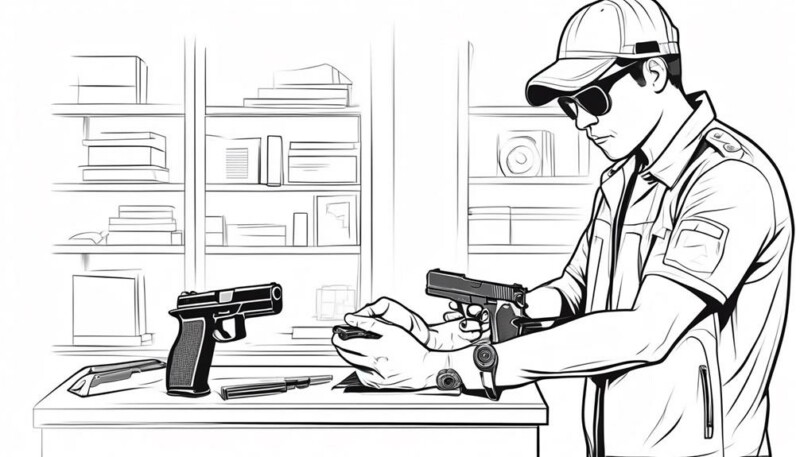As you set foot on the path of gun ownership, it's not just about locking and loading. It's crucial to understand that owning a firearm isn't just a right but a responsibility that comes with a labyrinth of laws and safety measures.
You've got to be familiar with everything from the legal aspects of purchasing and transporting firearms to the nuances of gun safety. It's a lot to take in, especially if you're new to this, but don't worry, we've got you covered.
Curious about what you should know and where to start? Well, don't stop now, there's a lot more to uncover.
Key Takeaways
- Background checks are mandatory for firearm purchases in Texas.
- Safe gun storage practices are important for preventing accidents and unauthorized access.
- Seek professional training and education for safe and responsible gun handling.
- Stay informed about federal and state-specific firearm laws and regulations.
Understanding Basic Firearm Laws

Let's dive into understanding the basic firearm laws in Texas, which include background checks for purchases, open carry and concealed carry laws, handgun licensing, restrictions for felons, and local regulations. As a prospective or current gun owner, the Texas State Law Library should be your first stop for accurate information.
When purchasing firearms, background checks are mandatory under Texas law. These checks ensure that you don't have a criminal history that would disqualify you from owning a firearm.
Another aspect of gun laws includes open carry and concealed carry rules. You're allowed to open carry a handgun in Texas, as long as you have a License to Carry (LTC). For concealed carry, an LTC is also required.
Handgun licensing in Texas involves a thorough process that includes a criminal background check, fingerprinting, and firearm safety rules training. If you're a felon, Texas laws restrict you from owning a firearm.
In addition to state laws, local regulations also govern the use of firearms. These laws can vary across municipalities, counties, and shooting ranges, so it's important to familiarize yourself with these regulations to ensure your safety and compliance.
Importance of Gun Safety Measures
Gun safety measures aren't just about adhering to rules, they're about protecting your life and those around you. Understanding essential firearm safety rules and how to avoid accidental discharges is part of being a responsible gun owner.
Also, knowing about safe gun storage practices can help prevent unwanted incidents from happening.
Essential Firearm Safety Rules
Often, understanding and strictly adhering to essential firearm safety rules can significantly reduce the risk of accidents. Whether you're in Texas or anywhere else, the rules remain the same.
- Treat all firearms as if they're loaded, even if you're certain they're not.
- Always handle a firearm with caution, keeping it pointed in a safe direction.
- Refrain from touching the trigger until you're ready to shoot.
- Under Texas law, and federal gun regulations, gun ownership comes with responsibilities. This includes being aware of your target and what's beyond it.
- Lastly, secure gun storage is a must. Firearms should be stored unloaded, particularly if you don't have a concealed carry license.
These measures are vital to ensuring a safe firearm environment.
Avoiding Accidental Discharges
Building on the groundwork of basic firearm safety rules, it's crucial to underscore the importance of avoiding accidental discharges, a key aspect of responsible gun ownership. This beginner's guide to firearm laws and safety measures insists on the following:
- Always treat every firearm as if it's loaded.
- Always keep your finger off the trigger until you're sure you intend to shoot.
- Always keep the firearm pointed in a safe direction.
- Be sure of your target, and what's beyond it.
- Never touch the trigger until you're ready to fire.
These practices are foundational in avoiding accidental discharges.
Safe Gun Storage Practices
While it's essential to handle firearms safely, it's equally vital to store them properly to prevent unauthorized access and accidental discharges. This beginner's guide to firearm laws can help you understand the importance of safe gun storage practices.
Always bear in mind that firearms and shooting at a gun range also require careful storage at home. Here's a simple table to guide you:
| Laws and Requirements | Safe Gun Storage Practices |
|---|---|
| Background Checks | Assessing the person's eligibility to own a firearm |
| Concealed Handgun License | Safekeeping when not in use |
| Gun Registration | Helps trace firearm if stolen |
Decoding Concealed Carry Regulations
Let's dive into the complexities of concealed carry regulations, starting with understanding the local rules about carrying firearms in various locations. This beginner's guide to firearm laws and safety measures aims to help you navigate through it all.
In decoding concealed carry regulations, you must consider:
- Handgun licenses: These are mandatory in some states before you can carry a concealed weapon.
- Constitutional carry: This allows you to carry a concealed firearm without a license in some states.
- Open carry vs concealed carry: While open carry is publicly displaying your firearm, concealed carry means hiding your weapon from view.
- Castle Doctrine and Stand Your Ground laws: These laws dictate when you can use your firearm in self-defense.
- Unlicensed carry and permitless carry: These terms refer to carrying a firearm without a license. Understand that this is illegal in many states.
Don't forget about rules for guns in cars. Some states allow it, others don't.
Always remember, understanding and following these rules isn't just about compliance, it's also about ensuring your safety and the safety of those around you.
Tips for Secure Firearm Storage

When it comes to secure firearm storage, you need to consider both locking mechanisms and where you're storing your firearms.
Locks, whether trigger or cable, are essential for preventing unauthorized use.
Your choice of storage space, be it a locked cabinet, safe, or gun vault, further enhances the security of your firearms.
Locking Mechanisms
To ensure your firearms are inaccessible to unauthorized individuals, always secure them in a locked cabinet, safe, or gun vault.
This beginner's guide to firearm laws and safety measures will help you understand the importance of locking mechanisms whether you buy a gun, sell a gun, or travel with a gun.
Here are some tips:
- Educate children about firearm safety
- Use trigger locks or cable locks
- Store ammunition separately
- Regularly inspect firearms for damage
- Register your firearm to respect your Civil Rights
These measures will ensure your gun rights are protected without compromising safety.
Whether at home or at a sport shooting range, always prioritize safety measures in handling and storing firearms.
Storage Space Selection
Choosing the right storage space for your firearms is a critical step in ensuring their safety and security. As a gun owner, especially if you're a first-time gun owner who's just made the decision to purchase a gun or buy a firearm, it's paramount that you select a storage space that's safe and secure.
Consider a locked cabinet, safe, or gun vault. Wherever you keep your firearms, whether it's at home, at a firing range, or a sport range, ensure they're always pointed in a safe direction. Store firearms and ammunition separately for increased safety.
Regular checks for damage or malfunction are crucial. Remember, owning a firearm isn't just about the right to bear arms; it's also about responsible storage space selection.
Enhancing Your Firearm Skills
Before diving into the advanced techniques, it's vital to master basic firearm safety rules such as always pointing the gun in a safe direction, treating all firearms as if they're loaded, and keeping your finger off the trigger until ready to shoot. Enhancing your firearm skills involves more than just practicing at the range.
Consider the following steps:
- Attend gun shows: This allows you to network with experienced shooters, learn about different firearm types, and discover new techniques.
- Buying a gun: Choose a firearm that suits your needs and comfort. Always obey the law and understand the restrictions for felons.
- Training: Seek professional training. This could be before buying a firearm or after you inherit a gun.
- Practice: Regular practice, whether on a range or in a controlled environment, is key.
- Understand laws: This includes knowing the stipulations around selling a gun, when you can give a gun, and campus carry laws.
Next Steps for Beginner Gun Owners

As a new gun owner, your journey doesn't end at simply purchasing a firearm; it's crucial to take several steps to ensure you're handling your new responsibility safely and legally.
First off, understanding firearm laws and safety measures is fundamental. This includes familiarizing yourself with federal gun laws, including those specific to your state like Texas State Law, and local regulation of firearms.
Whether you buy your hand gun or long gun from a licensed dealer or a private dealer, or even receive it as a gift, knowing the law is paramount. Enrolling in a firearm safety course is a smart move for beginner gun owners. It teaches you safe handling, storage practices, and the legal implications of gun ownership.
Join a gun club or find a mentor experienced in gun handling. They can offer guidance, practical tips, and answers to your questions. Practicing at a shooting range is also advisable. Here, you'll improve your shooting skills and learn about different firearms.
Lastly, invest in a secure storage solution for your firearm to prevent unauthorized access. Being a responsible gun owner means prioritizing safety above all else.
Frequently Asked Questions
Can You Have Your Gun in Your Car in Texas?
Yes, you can have your gun in your car in Texas. However, you'll need a valid License to Carry (LTC) or be legally authorized to carry.
If you've got an LTC, you can keep a loaded handgun in your car, provided it's out of sight.
Without an LTC, the handgun must be hidden and you should be en route to or from your vehicle and a private place.
Make sure you're familiar with Texas firearm laws.
What Are the 4 Primary Rules of Firearm Safety?
You've asked about the 4 primary rules of firearm safety.
First, always keep the firearm pointed in a safe direction.
Second, treat all guns as if they're loaded.
Third, keep your finger off the trigger until you're ready to shoot.
Lastly, always be sure of your target and what's beyond it.
Following these safety rules shows you're a responsible gun owner.
What Are the 5 Rules of Gun Safety?
You're navigating the world of gun safety, huh? Remember, always point your firearm in a safe direction.
Treat every gun as if it's loaded.
Don't touch the trigger until you're ready to shoot.
Be sure of your target and what's behind it.
Lastly, store your firearm unloaded and secured.
It's about respect, responsibility, and caution.
Stay safe out there.
What Are the Four 4 Cardinal Rules of Gun Safety?
You're asking about the four cardinal rules of gun safety. Here they are:
1) Always treat every gun as if it's loaded.
2) Never point a gun at anything you're not willing to destroy.
3) Keep your finger off the trigger until ready to shoot.
4) Identify your target and what's beyond it.
Following these rules ensures safety and helps prevent accidental discharges or injuries.
Conclusion
In conclusion, familiarizing yourself with firearm laws and safety measures is paramount as a new gun owner. Remember, 'knowledge is power' – understanding your local, state, and federal laws not only keeps you on the right side of the law, but also ensures your safety and those around you.
Practice safe handling, proper storage, and regular training. It's not just about owning a gun, it's about being responsible and informed.
Everyone's safety depends on it.
